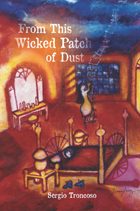
Spanning four decades, this is a story of a family’s struggle to become American and yet not be pulled apart by a maelstrom of cultural forces. As a young adult, daughter Julieta is disenchanted with Catholicism and converts to Islam. Youngest son Ismael, always the bookworm, is accepted to Harvard but feels out of place in the Northeast where he meets and marries a Jewish woman. The other boys—Marcos and Francisco—toil in their father’s old apartment buildings, serving as the cheap labor to fuel the family’s rise to the middle class. Over time, Francisco isolates himself in El Paso while Marcos eventually leaves to become a teacher, but then returns, struggling with a deep bitterness about his work and marriage. Through it all, Pilar clings to the idea of her family and tries to hold it together as her husband’s health begins to fail.
This backdrop is then shaken to its core by the historic events of 2001 in New York City. The aftermath sends shockwaves through this newly American family. Bitter conflicts erupt between siblings and the physical and cultural spaces between them threaten to tear them apart. Will their shared history and once-common dreams be enough to hold together a family from Ysleta, this wicked patch of dust?
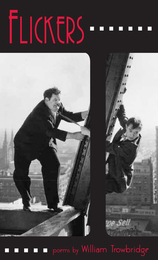
These poems are dark comedies that capture both the eerie and the ordinary. This balance is not easily achieved, but like a veteran comedian executing a pratfall, Trowbridge makes it all seem natural. His surreal family, the Glads, satirizes life in suburbia and reflects the often absurd margins of our urban lifestyle. By contrast, a group of poems revolving around a packing house in Kansas City (Trowbridge worked there as a young man), reminds us of those darker places in our lives that exist just “across the street from the ledgers and lapels.”
The variety of subjects Trowbridge works with is refreshing. Whether he is writing about Buster Keaton, Fred Astaire, June bugs, baseball, the holocaust, Cadillacs, or old dogs, his eye is always focused on the turn of phrase that will catch us off guard. His well-crafted lines are full of wit and humor. He approaches his subjects like Coyote approaches Fox—smiling, ready to expose his dear friend to the reality of his existence through sleight of hand. And, like Coyote, he teaches us to laugh at ourselves or perish under the weight of our everyday lives.
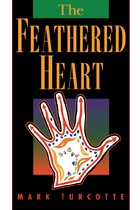
This revised and expanded edition of The Feathered Heart, Mark Turcotte's celebrated collection of Native American poetry, brings traditional oral culture to print. Torn, painful, vibrant, and full of hope, his poetry weaves together the multilayered and textured fabric of contemporary Native American urban and rural existence. Appropriately, each poem in The Feathered Heart possesses a deeply lyrical quality. Raw emotion echoes in Turcotte's voice, in his verse, in the things he sees. "Ten Thousand Thousand Bones," for example, "a poem about the desecration of Native American burial sites and objects by archeologists," is dedicated "to an ancient woman taken from the Earth near New Lenox, Illinois in the winter 1993/94."
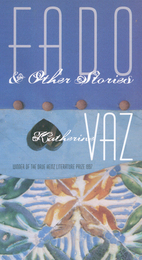
This collection is filled with narrative and character grounded in the meaning and value the earth gives to human existence. In one story, a woman sleeps with the village priest, trying to gain back the land the church took from her family; in another, relatives in the Azores fight over a plot of land owned by their expatriate American cousin. Even apparently small images are cast in terms of the earth: Milton, one narrator explains, has made apples the object of a misunderstanding by naming them as Eden’s fruit: “In the Bible, no fruit is named in the Garden of Eden - and to this day apples are misunderstood. They were trying to tempt people not into sin but into listening to the earth more closely. . . . their white meal runs wet with the knowledge of the language of the land, but people do not listen.”
Vaz’s beautiful, intensely conscious language often delicately slips her stories into the realm of the fado, the Portuguese song about fate and longing. “Listen for the nightingale that presses its breast against the thorns of the rose,” on character sings, “that the song might be more beautiful.” Such a verse might describe Vaz’s own motive behind her willingness to confront her subject’s ambiguities and her characters’ conflicts - the simultaneous joy and sorrow of some of life’s discoveries, the pain sometimes hidden within passion and pleasure.
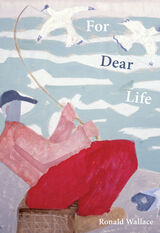
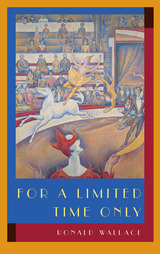
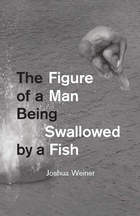
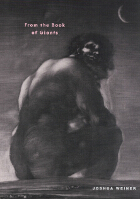
Song
for Thom Gunn
There is no east or west
in the wood you fear and seek,
stumbling past a gate of moss
and what you would not take.
And what you thought you had
(the Here that is no rest)
you make from it an aid
to form no east, no west.
No east. No west. No need
for given map or bell,
vehicle, screen, or speed.
Forget the house, forget the hill.
Taking its title from a set of writings found in the Dead Sea Scrolls, From the Book of Giants retunes the signal broadcast from these ancient fragments, transmitting a new sound in the shape of a Roman drain cover, in imitations of Dante and Martial, in the voice of a cricket and the hard-boiled American photographer Weegee, in elegies both public and personal, and in poems that range from the social speech of letters to the gnomic language of riddles. Out of poetry’s “complex of complaint and praise,” Joshua Weiner discovers, in one poem, his own complicity in Empire during his son’s baseball game at the White House. In another, an embroidered parrot sings a hermetic nursery rhyme to an infant after 9/11.
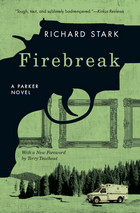
Between Parker’s 1961 debut and his return in the late 1990s, the whole world of crime changed. Now fake IDs and credit cards had to be purchased from specialists; increasingly sophisticated policing made escape and evasion tougher; and, worst of all, money had gone digital—the days of cash-stuffed payroll trucks were long gone.
But cash isn’t everything: Flashfire and Firebreak find Parker going after, respectively, a fortune in jewels and a collection of priceless paintings. In Flashfire, Parker’s in West Palm Beach, competing with a crew that has an unhealthy love of explosions. When things go sour, Parker finds himself shot and trapped—and forced to rely on a civilian to survive. Firebreak takes Parker to a palatial Montana "hunting lodge" where a dot-com millionaire hides a gallery of stolen old masters—which will fetch Parker a pretty penny if his team can just get it past the mansion’s tight security. The forests of Montana are an inhospitable place for a heister when well-laid plans fall apart, but no matter how untamed the wilderness, Parker’s guaranteed to be the most dangerous predator around.

Between Parker’s 1961 debut and his return in the late 1990s, the whole world of crime changed. Now fake IDs and credit cards had to be purchased from specialists; increasingly sophisticated policing made escape and evasion tougher; and, worst of all, money had gone digital—the days of cash-stuffed payroll trucks were long gone.
But cash isn’t everything: Flashfire and Firebreak find Parker going after, respectively, a fortune in jewels and a collection of priceless paintings. In Flashfire, Parker’s in West Palm Beach, competing with a crew that has an unhealthy love of explosions. When things go sour, Parker finds himself shot and trapped—and forced to rely on a civilian to survive. Firebreak takes Parker to a palatial Montana "hunting lodge" where a dot-com millionaire hides a gallery of stolen old masters—which will fetch Parker a pretty penny if his team can just get it past the mansion’s tight security. The forests of Montana are an inhospitable place for a heister when well-laid plans fall apart, but no matter how untamed the wilderness, Parker’s guaranteed to be the most dangerous predator around.

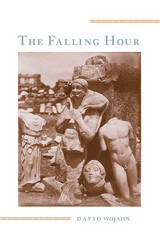
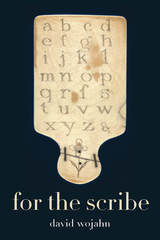
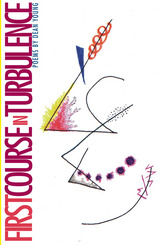
With rapid shifts between subject and tone, sometimes within single poems, Dean Young’s latest book explores the kaleidoscopic welter of art and life. Here parody does not exclude the cri de coeur any more than seriousness excludes the joke. With surrealist volatility, these poems are the result of experiments that continue for the reader during each reading. Young moves from reworkings of creation myths, the index of the Norton Anthology of Poetry, pseudo reports and memos, collaged biographies, talking clouds, and worms, to memory, mourning, sexual playfulness, and deep sadness in the course of this turbulent book.
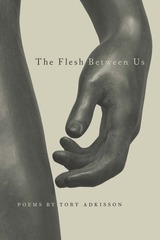
In The Flesh Between Us the speaker explores our connections to each other, whether they be lovely or painful, static or constantly shifting, or, above all, unavoidable and necessary. Intensely and unapologetically homoerotic in content and theme, The Flesh Between Us sensuously conducts the meetings between strangers, between lovers, between friends and family, between eater and eaten, between the soul and the body that contains it. Pushing the boundaries of what has been traditionally acceptable for gay and erotic content and themes, the poems adapt persona, Greek mythology, Judaism, and classic poetic forms to interrogate the speaker’s relationship to god and faith, to love and sex, to mother and father.
Stark and mythical, the imagery draws from the language of animals and nature. Episodes of kink tangle with creatures of forests and lore. In this tumult, the lines of poetry keep a sense of boundary and distance by the seeming incompatibility of their subjects: daybreak and dissection, human and insect, worship and reality. The touch of irreconcilable bodies, in Adkisson’s language, intimates the precise moment of love. The idea of love moves viscerally through rib, lung, throat, and mouth. The poems show how flesh opens in so many ways, in prayers, in bleeds, in ruts. The flesh, opened, begins to swell. If there is guilt in this, Adkisson’s poems refuse the placid satisfaction of confession. Whatever attachments the reader dares to draw must be made with blade or tongue. The reader must commit to the potential violence narrated by these poems.

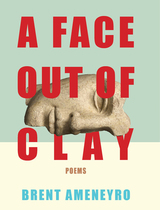
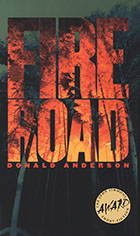
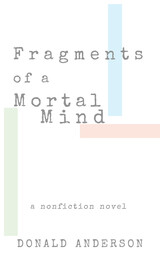
At once a memoir, a reading journal, and a novel, Fragments of a Mortal Mind is a daring, contemporary commonplace book. Donald Anderson, critically acclaimed author of Gathering Noise from My Life and Below Freezing, shows us how the disparate elements of our lives collect to construct our deepest selves and help us to make sense of it all. Anderson layers his personal experiences and reflections with those of others who have wrestled with inner and outer social, cultural, and political memories that are not as accurate as history might suggest but that each of us believe nonetheless. He challenges the reader’s sense of memory and fact, downplaying the latter in explaining how each of us crafts our own personal histories.
As Anderson weaves his voice among numerous other voices and ideas that rest upon other ideas, we are faced with larger issues of human existence: war, memory, trauma, mortality, religion, fear, joy, ugliness, and occasional beauty. What we have here is a meditation on living in America. We are shown how the world we consume becomes us as we metabolize it. How we, as humans, through our own fragments of memories, influences, and experiences become our true selves. By charting fragments of thoughts over a lifetime, Anderson exposes a way of thinking and perceiving the world that is refreshingly intuitive and desperately needed. Fragments of a Mortal Mind is a powerful masterpiece that closely resembles our lived experiences and is a vivid reflection of our time.
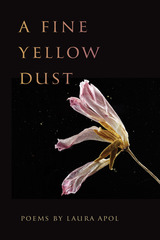


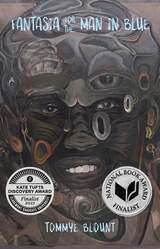
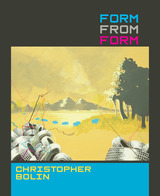
“Was it a crater or a sinkhole?” asks a voice in one of the mysterious, wonderstruck poems in Christopher Bolin’s Form from Form, whose cadences modulate with the energies of form-making, deformation, and elusive reformation. Natural forms and forms of human manufacture, forms of absence and those of urgent desire construct and deconstruct each other in Bolin’s singular music, which blends unnerving plainness and obliqueness, the childlike and the alien.
As their sites drift from workers’ camps to city squares, isolated coasts to windswept plains, the poems in Form from Form trace a map of a fragmented ecology, dense with physical detail of altered landscapes and displaced populations. In tones of austere beauty and harsh discordance, these poems provide a “field guide to luminescent things,” a visionary fretwork of the possibilities and impossibilities of faith in the present moment.
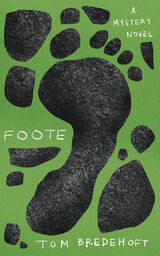
In the space of one weekend in Morgantown, West Virginia, private investigator Big Jim Foote finds himself at the center of two murder investigations. Suspected of one killing at a local festival, he locates the body of a missing person immediately after. The cops are watching him, and Big Jim has a secret he dares not reveal: he is a bigfoot living in plain sight, charged with keeping his people in the surrounding hills from being discovered. To protect the bigfoot secret, he must solve both murders—and convince himself it wasn’t a bigfoot who pulled the trigger.
Through the course of his investigations, Big Jim is helped by unique and well-rendered characters and friends in both his bigfoot and human communities. Readers are introduced to Appalachian mountain folk and traditional culture in new ways, even while Big Jim experiences the impact of the opioid epidemic on his own bigfoot kin. By centering a mythical creature as the unlikely protagonist in this enchanting literary murder mystery, Foote offers a winsome redefinition of a cryptid “monster” and breathes new life into the PI genre.
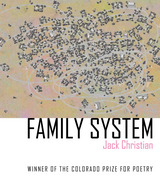
"Family System is one of the most specific and clarifying books of poetry I’ve ever read. It is filled with choices—made, to be made, not made—handled with a poetic understanding that what seems arbitrary will be inevitable when said with the right words while singing the right songs. This is a stand-out first book, introducing a first-rate original talent, doing powerful work, making quintessentially lyrical choices. Don’t miss this book.”
—Dara Wier
“It seems that Jack Christian’s brain is able to produce tiny lucid creatures, have them run and sprinkle over a map of an unknown world with joy, speed and delight. Even stranger, he’s somehow the spiritual offspring of very different ancestors: Pascal’s Esprit de Geometrie and Scandinavian mythology. ‘I was eulogizing a squirrel in a shoebox.’ Brilliant.”
—Tomaž Šalamun
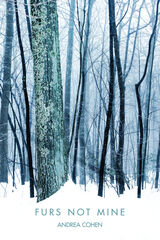
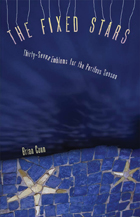
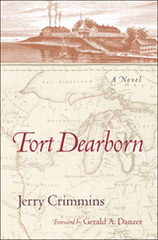
In a story that brings to life the founding of one of the world's great cities, Fort Dearborn takes us back to Chicago's early struggle of fire and blood. Through the eyes of two young boys and their fathers--one father a sergeant with the United States First Infantry, the other a Potawatomi warrior--we see the events that lead up to the Fort Dearborn Massacre. Using scores of letters, historical documents and maps, and long-forgotten Native American speeches, Jerry Crimmins breathes life into the little known drama that took place in the vicinity of the fort that once occupied what is now downtown Chicago. A suspenseful narrative, Fort Dearborn is also a remarkable historical account, minutely observed and meticulously documented, preserving a key moment in American history.
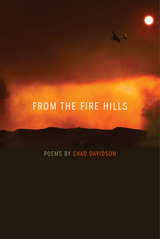
In From the Fire Hills, poet Chad Davidson shows us an Italy that is far from the romanticized notions of sun-drenched fields and self-discovery. Instead we see a maelstrom of chaos and contradiction, a place where the frenetic pace of modernity is locked in a daily struggle with recalcitrant history.
This autobiographical collection explores the myriad ways in which Italian culture survives its own parodies and evokes a modern ferocity that harkens back to Italy’s barbarian past. As the narrator, rendered vulnerable by language, embarks on his journey, lines of location, time, and perception blur. From the siren song of Dante’s grave to the heights of San Luca, from streets where policemen with Uzis tread a hair’s breadth away from the macabre remains of Capuchin monks, Davidson’s Italy is a study in contrast between the contemporary and the classical, the sacred and the profane. Within these poems sensual and savage revelations unfold, exposing new, uncanny, and often uncomfortable spaces to explore in this well-traveled realm of Western imagination.
Throughout the volume loom “the fire hills”: the scorched mountains of Sicily in summer; the memories of Italians living near the Gothic Line outside Bologna, where the Germans dug in and received heavy bombing at the close of World War II; even the wildfires igniting the San Gabriel foothills in southern California; all the way back to the burning city of Carthage in Virgil’s Aeneid. As the ash settles and the smoke clears, we realize that what we remember is often just remains, shells, and burned out wreckage, as if there were another type of memory.
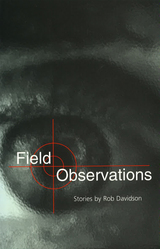
Field Observations, the debut fiction collection from Rob Davidson, contains stories about people who find themselves at difficult turning points in their lives—times when they are faced with hard choices, broken promises, and the fear of self-destruction. Davidson's characters are diverse: a retired math teacher, an auto repair worker, a technical writer, a nurse living overseas. What connects them is the way Davidson renders each character with essential human dignity, regardless of his or her flaws. This collection addresses such contemporary concerns as love relationships, cultural interaction, divorce, aging, and alcoholism in a lively, sometimes offbeat way.
In "Inventory"—winner of a 1997 AWP Intro Journals Award—the young narrator, fresh out of the army, struggles to take stock of his civilian life and assume responsibility for himself. An estranged wife, in "You Have to Say Something," competes for attention with her husband's manic approach to work, finding both solace and frustration in a new friend, a compulsive gift-giver. "A Private Life" renders a young Peace Corps volunteer grappling with her loneliness in a foreign country, with a sense of exposure and violation. In "What We Leave Behind," a college dropout and onetime golf prodigy finds himself dissatisfied with his current career as a vacuum cleaner salesman; after a quirky encounter with a client, he finds hope for a new beginning.
A recurrent motif in the stories is the presentation of characters who either tend to observe, even spy on, others, or who have the sense that they themselves are being watched. The notion of a passive observer extends to several characters who seem to treat their own lives as subject for observation rather than action, frequently persisting in patterns of behavior that are clearly destructive.
Rendered in clean, smooth prose with sharply observed details and driven by Davidson's fine ear for dialogue, these stories poignantly capture the difficult in-between states that trouble people every day. Fully defined and evocatively written, this collection addresses important real-life issues and concerns.


Using the metaphor of a “flight cage,” where birds are held captive, as physical manifestation of the space from which her speakers address us, Dunham reinvigorates the persona poem. Instead of “performing” historical figures such as Wollstonecraft, Dorothy Wordsworth, Anna Akhmatova, and Charlotte Perkins Gilman, she invites them to inhabit her, flickering in and out of sight, refusing an easy artifice.
A virtuoso of the phrase and image, Dunham displays a daring range of prosody. Drawing upon Wollstonecraft’s experimental travel narrative, the poet creates a threshold upon which the traditional “crown of sonnets” can be opened to the sudden breakage of collaged text, remaking both the received form and the now-conventional contemporary experimental poem.
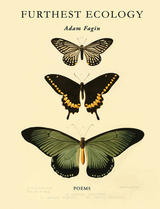
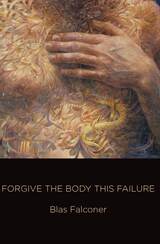
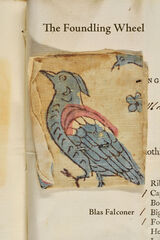
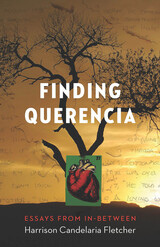
With its roots in the Spanish verb querer—“to want, to love”—the term querencia has been called untranslatable but has come to mean a place of safety and belonging, that which we yearn for when we yearn for home. In this striking essay collection, Harrison Candelaria Fletcher shows that querencia is also a state of being: the peace that arises when we reconcile who we are. A New Mexican of mixed Latinx and white ethnicity, Candelaria Fletcher ventures into the fault lines of culture, landscape, and spirit to discover the source of his lifelong hauntings. Writing in the persona of coyote, New Mexican slang for “mixed,” he explores the hyphenated elements within himself, including his whiteness. Blending memory, imagination, form, and language, each essay spirals outward to investigate, accept, and embrace hybridity. Ultimately, Finding Querencia offers a new vocabulary of mixed-ness, a way to reconcile the crosscurrents of self and soul.
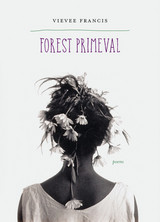
Winner, 2017 Kingsley Tufts Poetry Award
Winner, 2016 Hurston/Wright Legacy Award in the Poetry category
Finalist, 2015 Balcones Poetry Prize
Shortlist finalist, 2015 PEN Open Book Award for an exceptional book by an author of color
"Another Anti-Pastoral," the opening poem of Forest Primeval, confesses that sometimes "words fail." With a "bleat in [her] throat," the poet identifies with the voiceless and wild things in the composed, imposed peace of the Romantic poets with whom she is in dialogue. Vievee Francis’s poems engage many of the same concerns as her poetic predecessors—faith in a secular age, the city and nature, aging, and beauty. Words certainly do not fail as Francis sets off into the wild world promised in the title. The wild here is not chaotic but rather free and finely attuned to its surroundings. The reader who joins her will emerge sensitized and changed by the enduring power of her work.
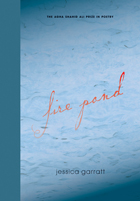
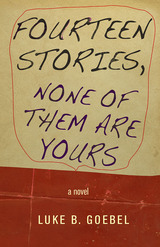
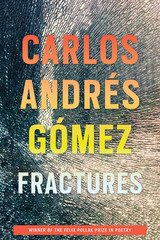
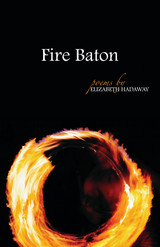
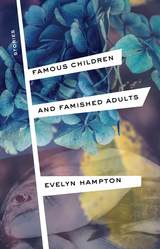
Stories that remap the world to reveal hidden places we have always suspected of existing and scenarios that show us glimpses of ourselves
In these stories, readers encounter a wizened, silent child; a documentary filmmaker lost in the Amazon; a writer physically overwhelmed by the amount of content she has generated; the disappearance of the world’s cats; and an enormous houseplant that has become quietly malevolent. Through these encounters, which are presented with insightful, intricate, and often very funny writing, readers come to know the scintillating zone where fiction and reality become indistinguishable.
Working in the tradition of voice impressionists like Maria Bamford, Hampton draws on a wide range of styles and voices to tell stories that seem at once familiar and strange, spoofed and invented. Readers who have enjoyed the work of Shirley Jackson, George Saunders, Lydia Davis, or Robert Walser will be at home in these pages, but so too will readers who have given up on fiction. These stories show us that insouciance can be beautiful, confusion can be intricate and ordered, and rule-breaking can be a discipline all its own.
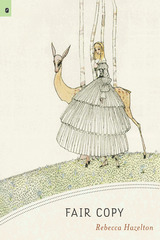
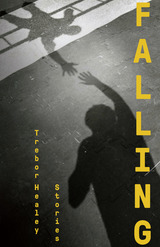
Together, these vignettes cover the dizzying breadth of human experience. From a contemporary reimagination of the life of Evita Perón with a gay man in the starring role to the story of an abandoned building full of ghosts in the center of Mexico City, this collection suggests other ways of seeing in a world overburdened by history.
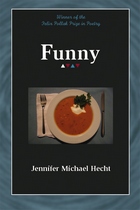
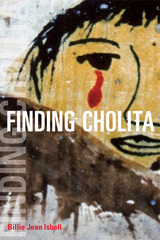


A powerful debut and a lyric coming-of-age narrative that interrogates the myths we carry
In Find Me When You’re Ready, Perry Janes traces a sweeping journey from Detroit to Los Angeles. As he leaves home and forges toward California, the speaker in these poems considers how we learn and mislearn ideas about manhood, confronts the aftershocks of childhood sexual abuse, and questions the human need for belonging. By embracing the touchstones of youth—movies, lore, graphic novels—these poems assert the speaker’s defiant right to childhood even amid damage.
As the collection arcs toward adulthood, the speaker embodies a vision of healing that refuses easy binaries and embraces the joys of intimacy. Across each of its five acts, Perry Janes’s debut collection is driven by an interest troubling our creation myths, asking who built them, why we carry them, and how we might set them aside.

Sketched together on a deceptively simple frame, this emotionally precise play uses its spare structure to devastating and darkly comic effect. A brother and sister have received word from their parents’ caretaker that their elderly parents may be a danger to each other. The brother breaks his routine to join his sister and mother on their weekly lunch date in hopes that together he and his sister can get a clearer picture of the situation. As the mother confronts the indignities of age and the children stare down a mounting list of losses and disappointments, an image of the family emerges that is true to life. Johnson gives readers an unwavering exploration of the ways that the love and knowledge family members have of one another creates both hurt and comfort.
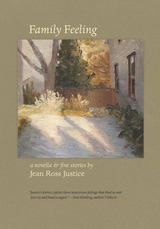
Many of the stories revolve around end-of-life scenes. An elderly man is visited by his middle-aged son’s young second wife and child, whom the son has temporarily abandoned in order to tend to his dying ex-wife. A recently widowed woman faces a complicated relationship with a troubled home health-care worker who had been uncommonly kind to her dying husband. Four middle-aged siblings reconvene in their childhood home to attend to the death of their father and find themselves simultaneously children of, and parents to, their own parents.
The unobtrusive historical breadth of the stories is remarkable. Reflecting back to Depression-era southern America from the perspective of the early twenty-first century, the characters provide us with an intimate view of the changing cultural landscape of our country. Issues of class are not merely ideological here—they are fluid and intricate aspects of fate and of soul.
Justice’s prose is characterized by quiet humor and attention to gesture. The deeply self-reflective and self-contained narrators offer us a window into issues of aging and mortality that is real and rare. In the manner of Alice Munro or William Trevor, Jean Ross Justice’s thought-driven fiction centers on pivotal moments of action or conversation that haunt—or reverberate—for decades.
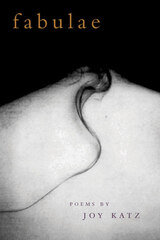
In Fabulae, Joy Katz interrogates the physical world, constructing a sensual and striking autobiography. She turns to the familiarity and strangeness of the female body, its surfaces and inner workings, often, although her subjects range from Thomas Jefferson to an Adam and Eve plagued with obsessive-compulsive disorder to the streets of New York’s diamond district. The poems, by turns funny and philosophical, point to how we suffer from desire: the danger, she writes, is that we might love the world “like heaven and be lost.” But they come back to delight in a flawed world especially the palpable beauty of words, and even the erotic shapes of the letterforms that make them up.

After the death of her mother, Kay Seger abandons her career as a historical consultant to a Los Angeles film company and returns to her childhood home in Michigan. There, she rekindles a teenage love affair with Joe Chase, now a Vietnam War veteran and Ford auto worker. Afflicted by grief and the mysterious symptoms of an unidentified ailment, Kay, at Joe's urging, begins an investigation of her family's past.
As Kay pores over the boxes of papers, letters, and photo albums her mother left behind, vivid recollections of a bygone Detroit, ragged and teeming at the start of the automotive age, come to life alongside snapshots of Michigan's rural western counties after the settlement of the frontier. In the midst of her searches, Kay comes across the long-forgotten medical history of nostalgia, and it is this new knowledge that helps her to recover the lost histories of her family and find a resolution to her troubled relationship with Joe.
An exploration of memory as both pathology and promise, Ford Roadoffers a moving examination of the injuries we inflict on the people closest to us, the worldly injuries that are often beyond our control, and our astonishing ability to act upon and inhabit our own stories. It is also a meditation on American car culture, the road, and the role of early Hollywood in the creation of America's vision of itself. Written in spare, evocative prose, historian Amy Kenyon's first novel is as heartbreaking as it is thought-provoking.
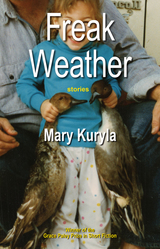
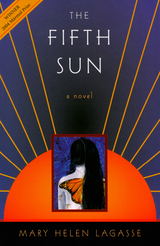
Winner of the 3rd Annual Miguel Mármol Prize from Curbstone Press, Mary Helen Lagasse's The Fifth Sun is an inspiring story of an immigrant who struggles valiantly for a better life for herself and her family. A young Mexican woman, Mercedes, leaves her village to work as a housemaid in New Orleans. This fast-paced novel takes us through her adventures in New Orleans, her marriage, her struggle to raise her children, her deportation, and her attempt to re-cross the river and be reunited with her children.
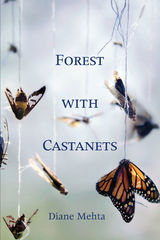
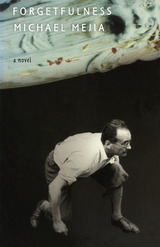
The second part of the book takes place in Vienna on May 1st, 1986, shortly before the election of Kurt Waldheim as President of the Austrian Republic and shortly after the Chernobyl disaster. The three simultaneous, intertwining monologues of an archivist, a retired opera singer, and the author of the monograph, revisit the themes and events of the first part, commenting on postwar conceptions, analyses, and revisions of the period during which Webern lived, while continuously haunted by the specters of Waldheim and Chernobyl, the persistence of crimes that are immanent, unpaid for, or only dimly, disingenuously recalled.

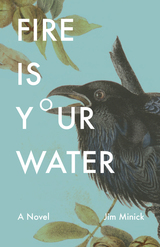
Sacred chants are Ada Franklin’s power and her medicine. By saying them, she can remove warts, stanch bleeding, and draw the fire from burns. At age twenty, her reputation as a faith healer defines her in her rural Pennsylvania community. But on the day in 1953 that her family’s barn is consumed by flame, her identity as a healer is upended. The heat, the roar of the blaze, and the bellows of the trapped cows change Ada. For the first time, she fears death and—for the first time—she doubts God. With her belief goes her power to heal. Then Ada meets an agnostic named Will Burk and his pet raven, Cicero.
Fire Is Your Water is acclaimed memoirist Jim Minick’s first novel. Built on magical realism and social observation in equal measure, it never gives way to sentimentality and provides an insider’s glimpse into the culture of Appalachia. A jealous raven, a Greek chorus of one, punctuates the story with its judgments on the characters and their actions, until a tragic accident brings Ada and Will together in a deeper connection.
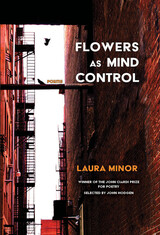
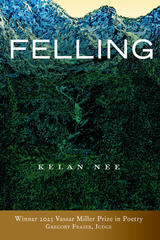
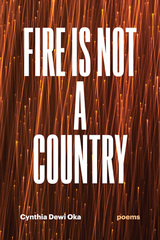
As she builds a lyric portrait of her own family, Oka interrogates how migration, economic exploitation, patriarchal violence, and a legacy of political repression shape the beauties and limitations of familial love and obligation. Woven throughout are speculative experiments that intervene in the popular apocalyptic narratives of our time with the wit of an unassimilable other.
Oka’s speakers mourn, labor, argue, digress, avenge, and fail, but they do not retreat. Born of conflicts public and private, this collection is for anyone interested in what it means to engage the multitudes within ourselves.
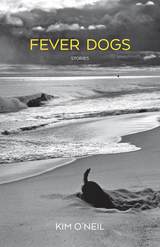
Kim O’Neil’s debut collection, Fever Dogs, is a fictional biography of three generations of women. It begins at the turn of the twenty-first century with Jean, a young woman at an impasse. Romantically adrift, in a dying profession, she decides that to make herself a future, she must first make herself a past.
To deal with a violent history, Jean’s mother has violently erased it. Starting from a bare outline that includes an unspoken death, a predatory father, and a homeless stint, Jean reconstructs the life her mother, Jane, might have lived. But origin stories can never completely cover their tracks: like Jean’s story, Jane’s cannot be told apart from that of her own mother.
What follows is a set of stories spanning nearly a century in response to questions the narrator wishes she had asked her mother and to which she has disjointed answers at best. In the absence of answers, the narrator, in various points of view, invents them. As the stories progress backward in time, the footholds in fact grow fewer and the shift to fabulism greater. But in her attempt to unravel her mother's origin and her own, Jean finds that the stories she invents—like the dogs who run through them as witnesses, allies, and objects of desire—serve as well as any other in the makeshift task of authoring a life.
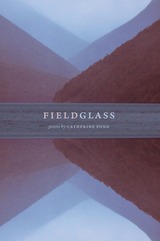
Fraught with obsession, addiction, and unrequited love, Catherine Pond’s Fieldglass immerses us in the speaker’s transition from childhood to adulthood. A queer coming-of-age, this collection is a candid exploration of sexual identity, family dynamics, and friendships that elude easy categorization, offering insight on the ambiguous nature of identity.
Saturated by her surroundings and permeated by the emotional lives of those close to her, the speaker struggles with feelings of displacement, trauma, and separateness. She is perpetually in transit, with long drives, flights, and train rides—moving most often between the city and the foothills of the Adirondack Mountains. As the collection unfolds, the speaker journeys toward adulthood, risking intimacy and attempting to undo her embedded impulses toward silence and absorption.
Reflective, graceful, and understated, Pond’s images accumulate power through restraint and suggestion. Deeply personal and intense, searching and yearning, associative and lyric, Fieldglass is a confessional about growing up, loving hard, and letting go.

In these wide-ranging personal essays, Richman travels interior roads through fear, kindness, ignorance, darkness, wildness, compassion, solitude, loneliness, and more—always asking how external geography informs our internal geography. From the monsoonal rains in the carved slot canyons of the Escalante to the eroticism of dirt on skin in a remote slice of the Grand Canyon; from the defiance of academic authority to the curled, arthritic fingers of her mother and grandmothers, Richman sinks into the realities that make us human and fallible and blessed.
Inspired by masters of the traditional personal essay such as E.B. White and M.F.K. Fisher, Richman adds a unique, deeply intimate—and often humorous—voice to the concurrence of human experience. Like a desert stream, human meaning meanders before coming to rest. Richman’s authentic voice illuminates the place where internal and external landscapes merge into meaning. Time with these genuine, inclusive pieces is time well spent.
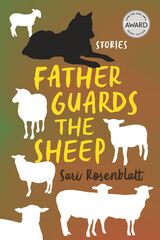
In Sari Rosenblatt’s collection, by turns tender and hilarious, we see fathers who are bullies and nervous watchdogs, haunted by their own pasts and fear of the future they may never see. And who do their daughters become? A substitute teacher who encounters mouthy students who believe she’s not real. Another lands a job on her city’s arson squad, researching derelict properties their owners might want to burn. A beleaguered mother, humiliated by the PTA’s queen bee, finds solace in an ancient piece of caramel candy. “I keep sucking,” she says, “until some flavor, no longer caramel, comes out.” In the end, this is what all these finely wrought characters want: to wring sweetness from what’s been passed down to them.
Rosenblatt’s comic sensibility, so present in these stories, entertains and consoles, while seeming to say to her readers: you might as well laugh.
![front cover of from unincorporated territory [guma’]](https://www.bibliovault.org/thumbs/978-1-890650-91-9-thumb.jpg)
![front cover of from unincorporated territory [hacha]](https://www.bibliovault.org/thumbs/978-1-63243-049-6-thumb.jpg)
![front cover of from unincorporated territory [lukao]](https://www.bibliovault.org/thumbs/978-1-63243-041-0-thumb.jpg)
![front cover of From Unincorporated Territory [åmot]](https://www.bibliovault.org/thumbs/978-1-63243-118-9-thumb.jpg)
This book is the fifth collection in Craig Santos Perez’s ongoing from unincorporated territory series about the history of his homeland, the western Pacific island of Guåhan (Guam), and the culture of his indigenous Chamoru people. “Åmot” is the Chamoru word for “medicine,” commonly referring to medicinal plants. Traditional Chamoru healers were known as yo’åmte; they gathered åmot in the jungle and recited chants and invocations of taotao’mona, or ancestral spirits, in the healing process.
Through experimental and visual poetry, Perez explores how storytelling can become a symbolic form of åmot, offering healing from the traumas of colonialism, militarism, migration, environmental injustice, and the death of elders.
![front cover of from unincorporated territory [saina]](https://www.bibliovault.org/thumbs/978-1-890650-46-9-thumb.jpg)
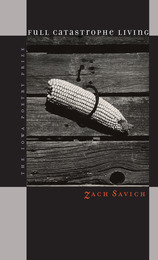
In meditations, songs, slapstick sequences, sonnets, narratives, and tightly carved fragments, Savich explores the conflicts between romance and reality, between inventing a new world and staying true to this one. Relishing both traditional and experimental poetics, he takes refreshing, ecumenical risks to show the “strange grace / of bells that ring with a rag’s polishing.” Like a Fourth of July band conductor guiding planes to land, his poetic wit alters what’s real. This book will change the ways that readers think about poetry, language’s expressive capacity, and the robust world around us.

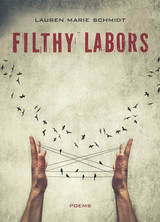

A novel of love, revenge, and redemption set during three crucial years of the Mexican Revolution (1910–13).
When an eccentric Mexican general dies and leaves his entire fortune to Isabel Brentt, the American daughter-in-law he never met, his widow suspects foul play and seeks revenge against the young woman.
This is a story of love, the backlash of revenge, and the choices that define us: A young lawyer sets off on a quest to find the truth about the general’s death. A bodyguard is ordered to murder the man he is supposed to protect. A ruthless criminal falls in love with a prostitute. A priest is forced to maintain an elaborate lie. An accused patricide seeks redemption through a brotherhood of criminals. Above all, it is Isabel’s exploration of the problem of evil and of prayer as a pathway to inner freedom.
Sylvia Montgomery Shaw invites readers to follow the continuing romance of Benjamín and Isabel as both seek their freedom against the backdrop of a brutal war and learn the unexpected strength that can come from one’s inner will.

While working at a sleep lab in northern Germany, Rosemarie Ramee, a 38-year-old American neurologist, falls in love with Aslan, an eleven-year-old Turkish Cypriot. To get closer to the boy, RR undertakes a "marriage of convenience" to the boy's uncle. But when the uncle suddenly disappears, Ramee, alone with Aslan, must take the boy to his relatives in northern Cyprus. A train journey ensues, chronicled in RR's psychological reports and neurological inquiries.
But what begins as an objective "report" breaks down as the story progresses: RR's voice, hitherto suppressed and analytical, emerges hesitantly and then erupts, splintering every conception of inner and outer lives, solipsistic reality, and the irrevocable past. Consistently surprising and unrelenting, Fort Da turns one woman's illicit affair into a riveting exploration of language and the mind.

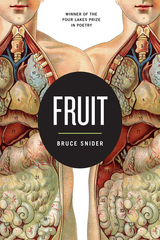

The Forest of Sure Things is a layered sequence of poems set in a remote, historic village at the tip of a peninsula on the Northwest Coast, near where Lewis and Clark encountered the Pacific. A pair of newlywed drifters has arrived and settled there, starting the town’s first new family in a hundred years. When their second child is stillborn, the bereft family unravels and un-roots themselves. Megan Snyder-Camp’s poems reveal — like the shoreline exposed by a neap tide — an emotional landscape pressed upon and buckling under the complications of grief and the difficulties of language.
With hypnotic, incantatory phrasing and imagery and an innovative approach to chronology, Snyder-Camp tells the story of the grieving couple, then dramatizes the impact of this enigmatic story on her imagination, her artistic practice, and her own new beginnings in married life and parenthood.
Based in part upon a brief, true story she was told, Snyder-Camp’s mysterious yet uncommonly compelling poetic sequence will draw the reader as if along a current pulling through the book. Acknowledging the importance of Anne Carson’s Autobiography of Red and Italo Calvino’s Invisible Cities, Snyder-Camp has spoken of her fascination with where language frays, as we try and use “story” to create what we remember and see where we are. What happens in a place, or a family, or a body, when time catches, or stops?
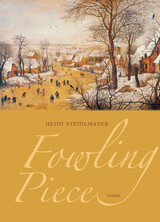
Winner, 2013 Kate Tufts Discovery Award
Winner, 2012 John C. Zacharias First Book Award for best debut book by a Ploughshares writer
A remarkably mature first collection of poems, Heidy Steidlmayer’s Fowling Piece is the debut of a highly original voice. As they search for meaning in both the extraordinary and the everyday, these poems, in exquisitely compressed language, display a fierce attention to the history of individual words and a surprising wit. In Steidlmayer's poetic landscape, words strike the reader as at once familiar and exotic, becoming instruments through which she is able to access and make sense of the most profound, irreducible aspects of human experience. Her mastery of and experiments in form are exceptional for a poet of any age. Fowling Piece offers the rare gift of a new poet whose work is truly new.
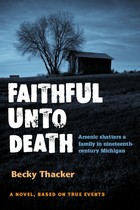
Benzonia, Michigan, 1894: a sleepy Congregationalist community, dedicated to the education of hardworking and virtuous young people of both sexes and all races. Anna Spencer Thacker is the daughter of missionaries, a faithful wife, and mother of five, pious to a fault. She is suddenly stricken with a mysterious ailment that soon proves fatal. Was it truly an unfortunate illness? Or was it murder---or suicide?
Taking a true story of a murder in her own family, Becky Thacker has crafted a historical mystery novel whose cast of characters rapidly builds, including William Henry Thacker as deputy sheriff, deacon in his church, a kind man . . . but perhaps just a trifle too fond of the attractive young housekeeper; and Charlotte Spencer, the pretty missionary sister, almost saintly in her efforts to bring Jesus to the Armenians in the mountains of Turkey, though a bit prone to exaggeration. She could be a suspect---or the next target.
The children are Roy, 19: musical, a good student, but a little too wild for Benzonia; Ralph, 17: trying to shoulder the responsibilities of farm and family; and Lottie, 14: a talented young artist trying to take care of young Will and Josie. Faithful Unto Death provides a window into the daily lives of small-town Michiganders at the turn of the century wrapped up in a riveting whodunit.
Cover image by Hemera/Thinkstock
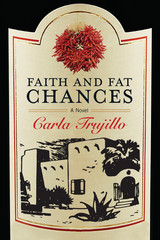
Finalist, 2012 PEN/Bellwether Prize for Socially Engaged Fiction
Carla Trujillo brings to life another side of the fabled city of Santa Fe in this rollicking novel set in Dogtown, a dilapidated neighborhood on the outskirts of town. Home to a hardscrabble community of working people struggling to make a living on meager means, Dogtown is worlds apart from the tourists, artists, and upscale eateries just a stone’s throw away. The close-knit neighborhood thrives in its own way, until an entrepreneur arrives with a plan to cast out its occupants and construct a winery in its place.
Led by Dogtown’s unofficial mayor, Pepa Romero—an irreverent healer with old-world wisdom and new-age knowledge—the citizens of Dogtown revolt. Using everything at their disposal, including spying, supernatural powers, the law, and individual cunning, they set in motion a thrilling and at times hilarious chain of events that culminates in a storm of epic proportions. With an unforgettable cast of characters, Faith and Fat Chances illuminates the ingenuity and resilience of people fighting to preserve their way of life.
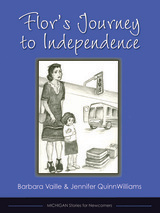
A modified version of this story is also available on our website, www.press.umich.edu/esl/stories.
The MICHIGAN Stories for Newcomers are original fiction written for adult English learners who wish to improve their reading and English skills
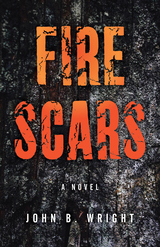
In John B. Wright’s debut environmental mystery, Matt Solberg is charged with discovering who is lighting fires in the forests that surround Missoula, Montana. A geographer with a deep personal need to bring people out of danger, Matt leads a search and rescue team whose job is to head directly into the mouth of hell, hiking into blazing backcountry to find missing residents. Matt and his team not only rely on their hard-won knowledge of Montana’s wild landscape, but also on Matt’s mentor, Dr. Bill Knight, a fire ecologist who understands the burning beast better than anyone.
When a suspicious fire destroys the mansion of a movie star, Matt must hike in to find his missing daughter and save her from the chaos. Then fires begin to explode everywhere as climate change drives temperatures over 100 degrees and rain refuses to fall, threatening thousands of homes. Who is setting these fires? Is it the Montana Tree Monkeys, an eco-radical group determined to scare off the newcomers? Or is it a retired smokejumper with an axe to grind about the encroaching mansions? Could it be Paladin, a shadowy figure leaving strange clues around the state? It’s Matt’s mission to find answers to these questions during a summer of heat, smoke, and unimaginable loss. Weaving together gripping drama and intriguing fire science, Fire Scars reveals the physical and psychological wounds we all carry—and the power we have to overcome.

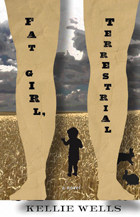

Proceeding from Hélène Cixous’s charge to “kill the false woman who is preventing the live one from breathing,” The Fix forges that woman’s reckoning with her violent past, with her sexuality, and with a future unmoored from the trappings of domestic life. These poems of lyric beauty and unflinching candor negotiate the terrain of contradictory desire—often to darkly comedic effect. In encounters with strangers in dive bars and on highway shoulders, and through ekphrastic engagement with visionaries like William Blake, José Clemente Orozco, and the Talking Heads, this book seeks the real beneath the dissembling surface. Here, nothing is fixed, but grace arrives by diving into the complicated past in order to find a way to live, now.
“Woman Seated with Thighs Apart”
Often I am permitted to return to this kitchen
tipsy, pinned to the fridge, to the precise
instant the kiss smashed in.
When the jaws of night are grinding
and the double bed is half asleep
the snore beside me syncs
to the traffic light, pulsing red, ragged up
in the linen curtain.
I leak such solicitous sighs
to asphalt, slicked with black ice, high beams speed
over my body whole
while the drugstore weeps its remedy
in strident neon throbs—
I doubt I’ll make it out.
It’s a cold country. It’s the sting of quarantine.
It’s my own two hands working
deep inside the sheets.
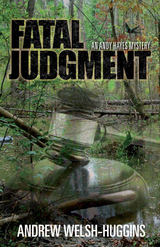
Judge Laura Porter fiercely guarded her privacy, and never more so than during her long-running—and long in the past—affair with disgraced quarterback-turned-private investigator Andy Hayes. Now she’s missing, disappeared just hours after she calls Andy out of the blue explaining she’s in trouble and needs his help.
A trail of clues leads Andy to a central Ohio swamp whose future lies in the judge’s hands as she weighs a lawsuit pitting environmentalists against developers. Soon Hayes encounters the case of another missing person, a young man who vanished without a trace in a different swamp two counties away. As he looks for links between the two disappearances, Hayes is led from Columbus to Cleveland, unearthing a history of secrets and betrayals threatening not just the judge but her family as well.
Along the way, Hayes is forced to confront a newly strained relationship with his older son, now a budding football star himself, and revisit his tumultuous days as a Cleveland Browns quarterback and the gridiron failures that haunt him to this day. In partnership with a cop on her own quest for justice, Hayes rushes to find the judge, and the truth, before it’s too late.
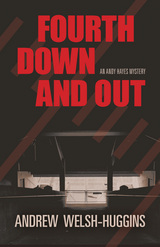
The job seems easy enough at first for private investigator Andy Hayes: save his client’s reputation by retrieving a laptop and erasing a troublesome video from its hard drive. But that’s before someone breaks into Andy’s apartment in Columbus; before someone else, armed with a shotgun, relieves him of the laptop; and before the FBI suddenly shows up on his doorstep asking questions.
Soon, there’s a growing list of people with a claim on the computer, all of them with secrets they don’t want uncovered. When one of those people ends up dead, Andy has his hands full convincing authorities he’s not responsible, while trying to figure out who is—and who’s got the laptop—before someone else dies. Soon the trail leads to the last place Andy wants to go: back to Ohio State University, where few have forgiven him for a mistake he made two decades earlier in his days as the Buckeyes’ star quarterback. That misjudgment sent him on a downward spiral that cost him a playing career, two marriages, several wrecked relationships, and above all his legacy in Ohio’s capital city, where the fortunes of the OSU team are never far from people’s minds.
As Andy tracks a laptop and a killer from the toniest of the city’s suburbs to its grittiest neighborhoods, he must confront a dark figure from his past and prove that this time he won’t drop the ball.
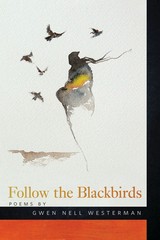

Laura Esther Wolfson’s literary debut draws on years of immersion in the Russian and French languages; struggles to gain a basic understanding of Judaism, its history, and her place in it; and her search for a form to hold the stories that emerge from what she has lived, observed, overheard, and misremembered.
In “Proust at Rush Hour,” when her lungs begin to collapse and fail, forcing her to give up an exciting and precarious existence as a globetrotting simultaneous interpreter, she seeks consolation by reading Proust in the original while commuting by subway to a desk job that requires no more than a minimal knowledge of French. In “For Single Mothers Working as Train Conductors” she gives away her diaphragm and tubes of spermicidal jelly to a woman in the Soviet Union who, with two unwanted pregnancies behind her, needs them more than she does. “The Husband Method” has her translating a book on Russian obscenities and gulag slang during the dissolution of her marriage to the Russian-speaker who taught her much of what she knows about that language.
In prose spangled with pathos and dusted with humor, Wolfson transports us to Paris, the Republic of Georgia, upstate New York, the Upper West Side, and the corridors of the United Nations, telling stories that skewer, transform, and inspire.
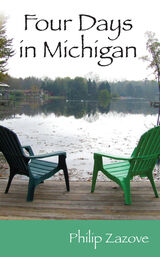
As a young, deaf Jewish woman living in a small town in Michigan in 1942, Sandra Horowitz felt deeply frustrated by her limited prospects. Even though she had just graduated from junior college, she knew that she had two strikes against her in fulfilling her dream to become a veterinarian. Better to marry Jacob Winter, her parents urged her, a deaf Jewish man who made a good living. Then, Sandra met Rudy Townsend, a hearing soldier on leave before shipping out to the war in Europe.
In just four days, both Sandra and Rudy’s worlds were turned upside down. Sandra’s parents feared him for being hearing and a Gentile, while Rudy’s parents expressed openly their bias against her ethnic background and her deafness. Even so, Sandra and Rudy soon realized that they had fallen in love, deeply and passionately. As they shared the brief time they had together, they learned about each other’s dreams for the future — Sandra’s desire to be a vet and Rudy’s determination to serve in Congress. Then, Rudy had to leave for the war.
Philip Zazove’s novel Four Days in Michigan captures perfectly the power of irrepressible love between two individuals from opposite backgrounds. The struggles they encounter in an era when such differences were never more sharply drawn also reveal great detail about deaf and hearing life. Despite all, their triumph comes ultimately because of their long-lasting individual respect and love.

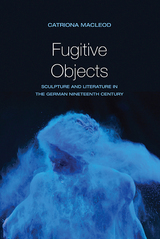
Winner of the 2014 Jean-Pierre Barricelli Prize for Best Book on Romanticism
In Fugitive Objects, Catriona MacLeod examines the question of why sculpture is both intensively discussed and yet rendered immaterial in German literature. She focuses on three forms of disappearance: sculpture’s vanishing as a legitimate art form at the beginning of the nineteenth century in German aesthetics, statues’ migration from the domain of high art into mass reproduction and popular culture, and sculpture’s dislodging and relocation into literary discourse. Through original readings of Clemens Brentano, Achim von Arnim, Adalbert Stifter, Leopold von Sacher-Masoch, and others, MacLeod reveals that if sculpture has disappeared from much of nineteenth-century German literature and aesthetics, it is a vanishing act that paradoxically relocates the statue back onto another cultural pedestal, attesting to the powerful force of the medium.

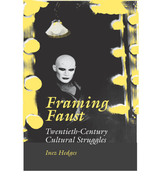
In this interdisciplinary cultural history that encompasses film, literature, music, and drama, Inez Hedges follows the thread of the Faustian rebel in the major intellectual currents of the last hundred years. She presents Faust and his counterpart Mephistopheles as antagonistic—yet complementary—figures whose productive conflict was integral to such phenomena as the birth of narrative cinema, the rise of modernist avant-gardes before World War II, and feminist critiques of Western cultural traditions.
Framing Faust: Twentieth-Century Cultural Struggles pursues a dialectical approach to cultural history. Using the probing lens of cultural studies, Hedges shows how claims to the Faustian legacy permeated the struggle against Nazism in the 1930s while infusing not only the search for socialist utopias in Russia, France, and Germany, but also the quest for legitimacy on both sides of the Cold War divide after 1945.
Hedges balances new perspectives on such well-known works as Thomas Mann’s Dr. Faustus and Jack Kerouac’s Dr. Sax with discussions of previously overlooked twentieth-century expressions of the Faust myth, including American film noir and the Faust films of Stan Brakhage. She evaluates musical compositions—Hanns Eisler’s Faust libretto, the opera Votre Faust by Henri Pousseur and Michel Butor, and Alfred Schnittke’s Faust Cantata—as well as works of fiction and drama in French and German, many of which have heretofore never been discussed outside narrow disciplinary confines.
Enhanced by twenty-four illustrations, Framing Faust provides a fascinating and focused narrative of some of the major cultural struggles of the past century as seen through the Faustian prism, and establishes Faust as an important present-day frame of reference.
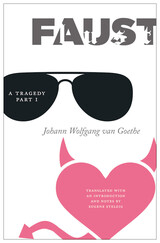
Published by Bucknell University Press. Distributed worldwide by Rutgers University Press.
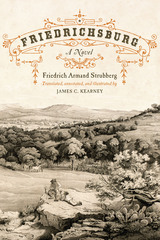
Summerfield G. Roberts Award for a Work of Creative Writing, Sons of the Texas Republic, 2013
First published in Germany in 1867, this fascinating autobiographical novel of German immigrants on the antebellum Texas frontier provides a trove of revelations about the myriad communities that once called the Hill Country home.
Founded in 1846, Fredericksburg, Texas, was established by German noblemen who enticed thousands of their compatriots to flee their overcrowded homeland with the prospect of free land in a place that was portrayed as a new Garden of Eden. Few of the settlers, however, were prepared for the harsh realities of the Texas frontier or for confrontation with the Comanche. In his 1867 novel Friedrichsburg, Friedrich Armand Strubberg, a.k.a. Dr. Schubbert, interwove his personal story with a fictional romance to capture the flavor of Fredericksburg, Texas, during its founding years when he served as the first colonial director.
Now available in a contemporary translation, Friedrichsburg brings to life the little-known aspects of life among these determined but often ill-equipped settlers who sought to make the transition to a new home and community on the Texas frontier. Opening just as a peace treaty is being negotiated between the German newcomers and the Comanches, the novel describes the unlikely survival of these fledgling homesteads and provides evidence that support from the Delaware Indians, as well as the nearby Mormon community of Zodiac, was key to the Germans’ success. Along the way, Strubberg also depicts the laying of the cornerstone to the Vereinskirche, the blazing of an important new road to Austin, exciting hunting scenes, and an admirable spirit of cultural cohesion and determined resilience. In so doing, he resurrects a fascinating lost world.
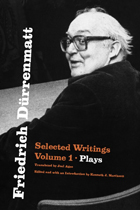
These translations of Friedrich Dürrenmatt’s plays introduce the writer to a new generation of readers.
The Swiss writer Friedrich Dürrenmatt (1921–90) was one of the most important literary figures of the second half of the twentieth century. During the years of the Cold War, arguably only Beckett, Camus, Sartre, and Brecht rivaled him as a presence in European letters. Yet outside Europe, this prolific author is primarily known for only one work, The Visit.
Dürrenmatt’s concerns are timeless, but they are also the product of his Swiss vantage during the Cold War: his key plays, gathered in the first volume of Selected Writings, explore such themes as guilt by passivity, the refusal of responsibility, greed and political decay, and the tension between justice and freedom. In The Visit, for instance, an old lady who becomes the wealthiest person in the world returns to the village that cast her out as a young woman and offers riches to the town in exchange for the life of the man, now its mayor, who once disgraced her. Joel Agee’s crystalline translation gives a fresh lease to this play, as well as four others: The Physicists, Romulus the Great, Hercules and the Augean Stables, and The Marriage of Mr. Mississippi.
Dürrenmatt has long been considered a great writer—but one unfairly neglected in the modern world of letters. With these elegantly conceived and expertly translated volumes, a new generation of readers will rediscover his greatest works.
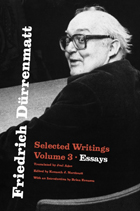
These translations of Friedrich Dürrenmatt’s essays introduce the writer to a new generation of readers.
The Swiss writer Friedrich Dürrenmatt (1921–90) was one of the most important literary figures of the second half of the twentieth century. During the years of the Cold War, arguably only Beckett, Camus, Sartre, and Brecht rivaled him as a presence in European letters. Yet outside Europe, this prolific author is primarily known for only one work, The Visit. With these long-awaited translations of his plays, fictions, and essays, Dürrenmatt becomes available again in all his brilliance to the English-speaking world.
Dürrenmatt’s essays, gathered in this third volume of Selected Writings, are among his most impressive achievements. Their range alone is astonishing: he wrote with authority and charm about art, literature, philosophy, politics, and the theater. The selections here include Dürrenmatt’s best-known essays, such as “Theater Problems” and “Monster Essay on Justice and Law,” as well as the notes he took on a 1970 journey in America (in which he finds the United States “increasingly susceptible to every kind of fascism”). This third volume of Selected Writings also includes essays that shade into fiction, such as “The Winter War in Tibet,” a fantasy of a third world war waged in a vast subterranean labyrinth—a Plato’s Cave allegory rewritten for our own troubled times.
Dürrenmatt has long been considered a great writer—but one unfairly neglected in the modern world of letters. With these elegantly conceived and expertly translated volumes, a new generation of readers will rediscover his greatest works.
READERS
Browse our collection.
PUBLISHERS
See BiblioVault's publisher services.
STUDENT SERVICES
Files for college accessibility offices.
UChicago Accessibility Resources
home | accessibility | search | about | contact us
BiblioVault ® 2001 - 2024
The University of Chicago Press









